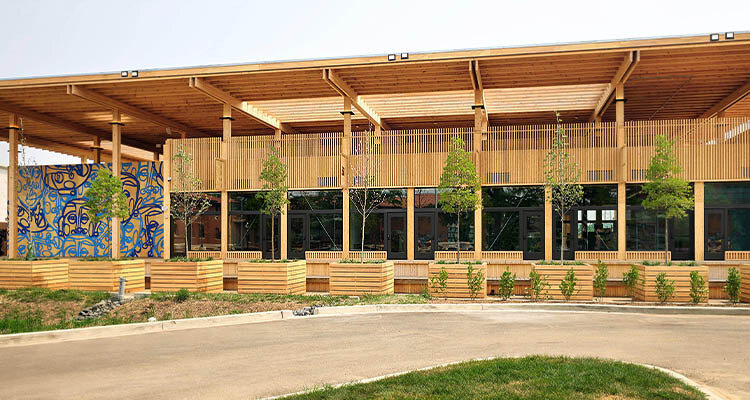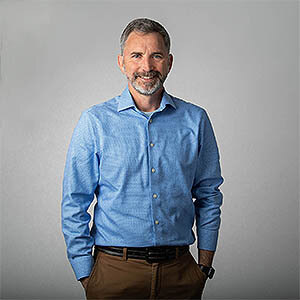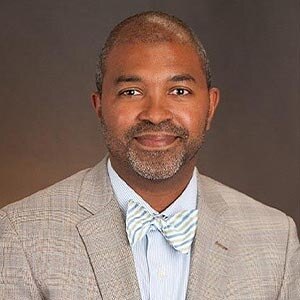
Dan Tangherlini and Omar Karim share how the modular retail development has transformed Southeast Washington, D.C.
While modular or prefabricated construction practices are not new, they are experiencing a resurgence in popularity due to a number of factors ranging from the rise in digital capabilities, need for new sustainability measures, and the ability to build on an accelerated timeline with increased cost savings. What is still relatively new to our industry is the development of modular structures that solely utilize natural materials and include operational systems that are best for our neighborhoods and our planet–all conceptualized and designed in lockstep with the community that will directly benefit from the project. One example of the innovative and sustainable applications of modular construction is the retail village at Sycamore & Oak, a new, 23,000-square-foot real estate development in Washington, D.C., completed in just under a year.

The retail village is a year-round shopping, arts and culture, and wellness community resource and destination in Southeast Washington, D.C. that provides the local community with centralized access to much-needed services and amenities, such as fresh food offerings, fitness and wellness programming, sit-down restaurants as well as business and economic opportunities–all led by local experts and entrepreneurs.
Community engagement
Sycamore & Oak utilized a groundbreaking combination of community engagement efforts, sustainable construction efforts and a modular design to deliver much-needed services to this overlooked corner of the city that consistently has poorer health outcomes and more food deserts than its neighboring D.C. communities.
Located on the campus of the historic former St Elizabeth’s psychiatric hospital, now home to new residential properties, direct services organizations, and the WNBA Washington Mystics, Sycamore & Oak is the result of a diverse, mission-aligned, public-private coalition, conceptualized in partnership with the Congress Heights community.
The key partners involved in the construction of this groundbreaking building were Banneker Ventures, a respected, local, Black-owned construction and real estate development firm, and Emerson Collective, an organization designed to develop opportunities and solutions in education, environment, immigration, and health equity through philanthropy, creativity, and investments. The involvement of Banneker as the general contractor is a reflection of how the project prioritized local and minority-owned businesses to lead every effort of this development from start to finish.
In addition to Banneker and Emerson, the coalition behind this development includes:
- Residents of the Congress Heights community, who provided advice, counsel, support and creativity to the effort.
- Congress Heights Training and Development Corporation, which led community engagement efforts and now manages the property.
- The Office of the Mayor, which was steadfast in its commitment to enhancing opportunities for the Congress Heights community.
- Redbrick LMD, the real estate company Emerson has partnered with for the project.
- The entrepreneurs who are part of the thirteen businesses now at Sycamore & Oak, all from the surrounding community.

Sustainable from the start
Environmental sustainability was an equally important goal as community and economic sustainability. Sycamore & Oak was designed with sustainability at the forefront of every design decision, and was built using FSC-certified, sustainably harvested mass timber. The project demonstrates the versatility and beauty of this carbon-sequestering building material that avoids the pitfalls of so many developments that impose an environmental cost on the communities they are meant to serve.
Sustainability was suffused throughout every aspect of the reimagination of the construction of Sycamore & Oak as a traditional village for the 21st century. This focus was then taken a step further after construction concluded, by using locally sourced wood from recovered street trees to create the furniture for the facility.
Modular approach
The life cycle for Sycamore & Oak was considered during every aspect of the construction. The entire structure was designed to be taken down and reused; it is the largest free-standing structure of its sort in the district and demonstrates the flexibility, economy, and sustainability of this ancient building material in its new, high-tech form. It is an all-electric building that highlights the efficiency and effectiveness of solar energy, battery storage, heat pumps and induction cooking.
The innovative modular structure allows for the entire building to be deconstructed, moved and rebuilt, which enables other places to leverage the success and sustainability of the Retail Village. Because of this innovative work, the Sycamore & Oak project has already won an award from the D.C. Department of Energy and Environment for demonstrating Equity and Inclusion in Sustainable Construction, and a leadership award from the Forest Sustainability Council for its use of regenerative materials and community engagement.
The development is the first installment of the larger proposed Sycamore & Oak project – a unique 650,000-square-foot, mixed-use real estate development that will include a hotel, affordable housing, retail, restaurants, and convening spaces.
We hope Sycamore & Oak will ultimately serve as a case study for all construction projects on how to ensure inclusive development, participatory economics, neighborhood engagement, and encourage community and planetary healing and transformation.
Emerson Collective is an organization designed to develop opportunities and solutions in education, environment, immigration, gun violence and health equity through philanthropy, creativity and investments. Emerson works in pursuit of a world where every individual has access to opportunity, health, and well-being, and brings together entrepreneurs and academics, artists, community leaders and more to build solutions that spur measurable, lasting change.
Established and led by Laurene Powell Jobs in 2011, Emerson Collective is working to create new possibilities for individuals, families, and communities.